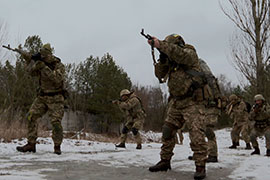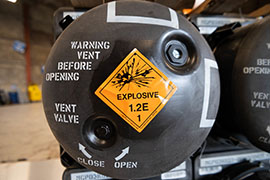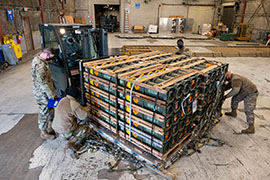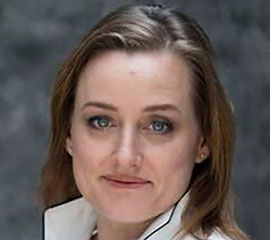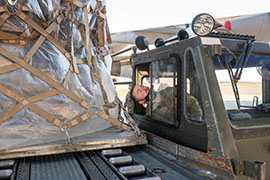- Slug: BC-CNS-Arizona Ukraine,1060
- 5 photos available (thumbnails, captions below)
By Reagan Priest
Cronkite News
WASHINGTON – Despite U.S. warnings that Americans should leave Ukraine in the face of a possible Russian invasion, former Arizona resident Lada Roslycky says she is standing her ground.
“It’s too important” to leave, said Roslycky, a security and defense consultant currently working in Kyiv, the Ukrainian capital. “There are too many people here that have been fighting to become a democracy and fulfill the reforms that are necessary.”
Roslycky, who describes herself as “an American Canadian of Ukrainian descent,” first felt compelled to assist Ukraine in 2014, when Russia annexed Crimea. She wanted to help in any way she could. She’s been there ever since.
“I really believe in justice, international justice,” she said in a Zoom interview from Kyiv. “When the war started in 2014, I had been in a position where I could no longer be in North America, I really needed to pick up my bags and help, as best as I (could), the people who have suffered in the country.”
As she spoke Wednesday, more than 150,000 Russian troops were poised near the Ukrainian border in what the Kremlin has insisted were military exercises in Belarus and southern Russia, but which Western leaders say is a run-up to an invasion. Despite weeks of diplomatic negotiations, President Joe Biden said Thursday that the odds of a Russian invasion are “very high.”
That has Roslycky’s mother, Halina Teulings, on edge. Teulings, whose son is also currently in Ukraine teaching English, recently returned from a visit with her children. While she does not always agree with their decision to move to and stay in Ukraine, she supports them no matter what.
“They have a saying in Ukrainian: Little children don’t let you sleep and big children don’t let you live,” said Tuelings, who was born in America to Ukrainian parents but spent time in that country as a child.
She moved to Arizona in 1993 for what was a temporary teacher job, but has stayed in the Phoenix area since. As a Ukrainian-American, Teulings said it’s unfortunate how little Americans know about the country and its relationship with Russia, especially because America is impacted by the conflict.
“Education in the United States and in general, is not what it used to be,” Teulings said. “What’s happening in the United States is influenced by outside countries and people are not aware of that because they’re ignorant.”
Eugene Clay, an associate professor with Arizona State University’s Melikian Center for Russian, Eurasian and East European Studies, explained that the conflict between Russia and Ukraine goes back centuries despite their similarities – or maybe because of them.
“Both Russia and Ukraine are Slavic nations; they both predominantly belong to the Orthodox branch of Christianity, they’re both East Slavs in their language, so the languages are similar but distinct, and Russia controlled Ukraine or most of Ukraine for several centuries,” said Clay, a professor of religious studies.
Because of this, Clay said, Russian President Vladimir Putin believes the nations should be reunited as they were before the fall of the Soviet Union. Ukrainians do not agree, and are now fighting to preserve the independence they gained in 1991.
Roslycky said the tensions in Kyiv are palpable, with residents on edge as troops lurk at the border and Russian government hackers engage in cyber attacks.
“It’s like you get onto a seesaw with a bully and it’s throwing you and you never know, are you going to fly off the seesaw?” she said. “Every day is this seesaw of informational attacks and confusing messages.”
Roslycky founded Black Trident, which describes itself as a “boutique defense and security consulting group,” in 2019. She said her biggest fear is that Ukraine’s allies will abandon the country, and Russia will invade, threatening Ukraine’s independence and its citizens’ lives.
Clay said it’s hard to predict what Russia will do, but he doesn’t think invasion is imminent because of the strong opposition from Western powers and the pace with which Putin has made advances toward Ukraine.
“I’m hopeful that the Western refusal to cave in to the Russian ultimatums is a positive sign and I think there’s a strong hope that Ukraine will retain some vital independence,” Clay said.
“At the same time, it’s clear that Ukraine is going to have to live with Russia and find ways of working with Russia because it is simply such a powerful next-door neighbor,” he said.
But Tuelings said that Ukrainians and Ukrainian-Americans like her have little faith in the ability of Western politicians to protect the country from Russia, pointing to their failure to act when Russia annexed Crimea in 2014.
“The world politicians, they should have done something immediately in 2014, when the Russians took Crimea away… they don’t make Russia responsible for anything,” she said.
Despite government warnings, her fears and her mother’s worries, Roslycky has no plans to leave Kyiv until the situation is more stable and the citizens of Ukraine are guaranteed the independence and democracy they desire.
“Although I miss America, and there’s no other place I’d rather be right now than Tempe, Arizona, I’m here and I’ll stay,” Roslycky said.
For more stories from Cronkite News, visit cronkitenews.azpbs.org.
^__=
Web links:
_ Biden Thursday: https://www.whitehouse.gov/briefing-room/statements-releases/2022/02/17/remarks-by-president-biden-before-marine-one-departure-14/
_ Biden on buildup: https://www.whitehouse.gov/briefing-room/speeches-remarks/2022/02/15/remarks-by-president-biden-providing-an-update-on-russia-and-ukraine/
_ State Ukraine advisory: https://travel.state.gov/content/travel/en/traveladvisories/traveladvisories/ukraine-travel-advisory.html
_ Black Trident: https://www.theblacktrident.com/about
_ Melikian Institute: https://melikian.asu.edu/
^__=
Ukrainian troops train in this undated photo. More than 150,000 Russian troops were massed on the Ukrainian border this week, with the White House saying an invasion could come within days. (Photo courtesy CNN)
The U.S. has committed more than $5.4 billion in security and non-security assistance to Ukraine, as it faces a possible Russian invasion. (Photo by Mauricio Campino/U.S. Air Force)
Airmen and civilians at Dover Air Force Base ready a shipment of ammunition, weapons and other equipment bound for Ukraine in late January. (Photo by Mauricio Campino/U.S. Air Force)
Lada Roslycky, a security and defense consultant, has been in Ukraine since Russia’s 2014 annexation of Crimea and says she intends to stay. (Photo courtesy Lada Roslycky)
Senior Airman Joseph Bittle loads ammunition, weapons and other equipment at Dover Air Force Base on Jan. 27, part of the $5.4 billion in assistance the U.S. has committed to Ukraine. (Photo by Mauricio Campino/U.S. Air Force)
